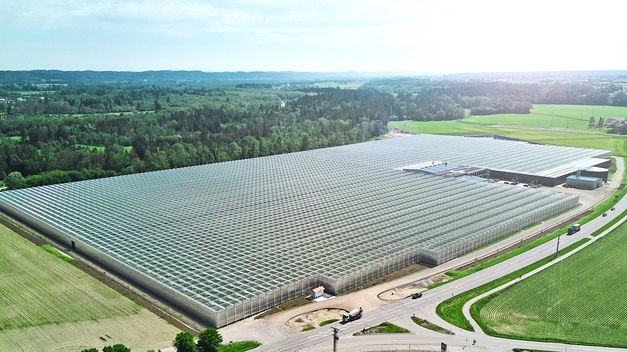Whether it's energy, climate, or global supply chains - the current times are bringing in entirely new challenges. That is why German retailer Kaufland focuses even more on year-round fruit and vegetables from Germany.
Together with the Reichenspurner family, Kaufland has opened one of Germany's most modern and sustainable greenhouses in Chiemgau. Here, strawberries, tomatoes, and peppers are grown and harvested year-round on an area the size of 22 soccer fields. Some of the electricity and heat required for this is already covered almost exclusively by renewable energies and will be in the near future, according to Kaufland.

Photo: Kaufland
TOVs
Throughout the year, a wide variety of tomato varieties such as TOVs in various sizes (cocktail, cherry, min roma and mini), and also beef tomatoes are grown and harvested for Kaufland. In addition, sweet peppers are grown between March and November. In addition to spring and late summer, the new greenhouse also supplies Kaufland stores with strawberries from Bavaria between October and December.
"Thanks to the greenhouse, we can offer tomatoes, peppers, and strawberries from Germany with a particularly aromatic taste and maximum freshness in our stores during the winter months," says Stefan Lukes, Managing Director of Purchasing Fruit and Vegetables at Kaufland. "By growing them in Germany, we save on transport times, which has a very positive effect on freshness. The vegetables get from the field to our stores much faster, usually less than 24 hours."
Bees and ladybugs: important greenhouse employees
On peak days, up to 30 tons of tomatoes, 15 tons of peppers, and up to six tons of strawberries are harvested and delivered fresh to Kaufland stores throughout Germany within a few hours, thanks to sophisticated logistics and short transport routes. For the best possible freshness and quality, the care and harvesting work is done by hand. A doctor of entomology and her scouting team check the plants daily for pests. These are specifically controlled by beneficial insects such as predatory bugs, ichneumon wasps, and ladybugs. Bumblebees and bees from a local apiary are used to ensure optimal pollination of the plants.
Sustainable energy supply via the sun and geothermal energy
"Our focus is on resource-saving and climate-friendly production. In the future, we will obtain our entire heat requirement from our own geothermal plant," says Thomas Reichenspurner from Reichenspurner Hof. There is a photovoltaic system on the roof of the processing area. The electricity produced there is used entirely in the greenhouse. "Via cogeneration, we produce the electricity needed to light the winter tomatoes, and the resulting waste heat does not go unused but is used to heat the greenhouse. A large part of the CO2 produced in the process is also needed for plant growth and is thus bound in the plants. In this way, we make the best possible use of the energy employed," says Reichenspurner.
Irrigation is carried out exclusively with rainwater. This is collected via the roof surfaces in a nearly 50,000 cubic meter outdoor pool next to the greenhouse. In the immediate vicinity, there are around 30 hectares of flowering areas as a habitat and refuge for insects, birds, and small animals. This area also acts as a natural CO2 reservoir.
Local production
A representative Kaufland study recently showed that many Germans also like to eat peppers or tomatoes in winter. It is important to more than half of Germans (55.4 percent) that vegetables are grown year-round in Germany.
"By growing fruit and vegetables regionally, we are making ourselves a bit less dependent on the current challenges in global supply chains, and in doing so, we are also supporting local fruit and vegetable growers," says Lukes. After all, the sustainable transformation and strengthening of domestic agriculture for more regional products is a central concern of Kaufland.
Regional growers
For a diverse selection of fresh fruit and vegetables throughout the year from Germany, Kaufland works with a large network of regional and national farmers who also produce organic and biodynamic fruit and vegetables. In Kaufland's fruit and vegetable section, customers can find more than 200 fruit and vegetable items from German farms throughout the year.
For more information:
unternehmen.kaufland.de
www.reichenspurner-hof.de
